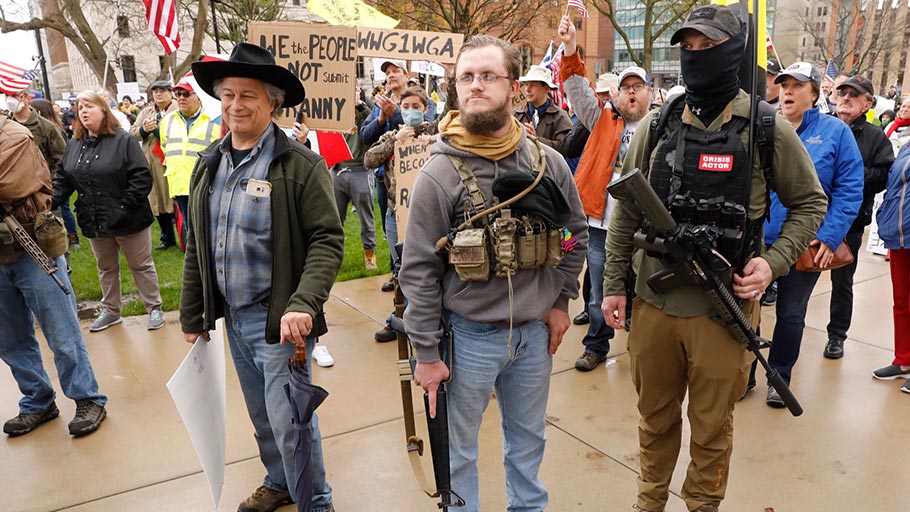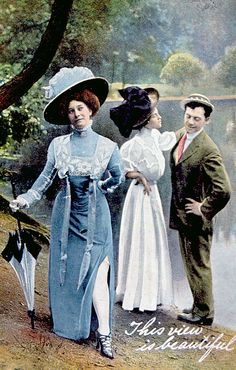Feminist Claim to Female Suffrage is Bogus
September 11, 2014

Half the British men who went to the trenches in France in 1914 didn't have a vote either. Women finally got the vote in the context of both sexes getting it for the war effort.
"Women were not really disenfranchised. They had the right to vote in local politics as much as most men, and they were able to take part in civic affairs too. They could even stand for local political office such as mayors. The suffragettes were not the heroines up at the cutting edge of social change as feminists would have us believe today. They were a group of middle-class activists, widely regarded at the time as trouble-makers."
by Herbert Purdy
Did Feminists Really Win the Vote for Women?
(Abridged by henrymakow.com)
At the beginning of the 20th century, women were neither oppressed nor disenfranchised as claimed by the feminists.
The truth is, women got the vote as part of the development of the universal franchise. The Representation of the People Act in 1832, (better known as 'The Great Reform Act') instigated the process of reform. Even then, however, only about one-in-six adult males were given the vote... The vast majority of men were just as much the victims as women.
It is true that the Great Reform Act only enfranchised, 'male persons', although John Stuart Mill MP, attempted to replace the term 'male persons' with just 'person' in a second reform bill of 1867 but was defeated... because at the time, women's interests were considered to be synonymous with those of their menfolk.
 Not only that, but women were elevated by men, society, by the law and even in the application of the law. Put simply, women were on a pedestal and accorded enormous rights over property as well as being protected legally from civil law in terms of that property, far more than men. The crusade by the suffragettes took place in the context of women being highly privileged already, and there was little stomach for the fight being stirred up by these extremists.
Not only that, but women were elevated by men, society, by the law and even in the application of the law. Put simply, women were on a pedestal and accorded enormous rights over property as well as being protected legally from civil law in terms of that property, far more than men. The crusade by the suffragettes took place in the context of women being highly privileged already, and there was little stomach for the fight being stirred up by these extremists.Married women were insulated from legal liability in a wide range of civil matters. Indeed, they were even protected from the consequences of certain breaches of the criminal law. A woman's husband stood between her and the world, protecting her as men had always done for women under the ancient system of couverture that placed enormous burdens on men: burdens, they often could not sustain.
That is just the way things were. Society was seeking the best it could given the prevailing circumstances, and that meant women were highly privileged, and men held highly responsible for that privilege.
Another factor in the resistance to Mill's reform was that, by then, feminism was rearing its head on the back of the emerging Marxist/Socialist movement. This was known as 'The Woman Question' in socialism, and it was feared as a force that could radically change society.
UNIVERSAL SUFFRAGE DUE TO THE WAR
However, the First Word War had changed everything. As the soldiers returned, millions of them did not have the vote. It had been said 'If they are fit to fight they are fit to vote', to which the Prime Minister at the time, Herbert Asquith, responded 'My hon. Friend puts it in a nutshell', and this is the primary reason why the Representation of the People Act of 1918 was passed.
This Act widened the franchise enormously and it fairly included women. It increased the overall electorate from about 7.7 million to 21.4 million, and women became 43% of those eligible to vote . To all intents and purposes, they had achieved near parity. However, the age restrictions for voting were different. For men it was 21 years and for women, it was 30 years of age provided some minimal property criteria were met in both cases. I will explain the reason for this in a moment.
Then, in the same year, the Qualification of Women Act 1918 was passed, largely in recognition of women's effort during the war. This provided the right for women to be elected to parliament even if they hadn't reached the age where they could vote. Women were being recognized. They were not being excluded.
But everything had changed. To put it bluntly, there were too few men left in society to allow women exactly the same voting rights as men. Even before the war, in 1911, females outnumbered males in England and Wales by 1.2 million. By 1921 the difference was 1.7 million. A whole generation of men, young men in the flower of their youth, had been wiped out in the trenches of France and Belgium.
To have granted women the vote then would have meant totally unbalancing politics, and society, and that was the main reason why there was resistance to the suffragettes' claims. Discrimination against women had nothing to do with it.
In fact, the suffragettes were a spent force on the fringe of society by then. Most women wanted nothing to do with them. The truth is, the suffragettes were actually a hindrance to the advancement of women's suffrage, not a help. Nevertheless, the Equal Suffrage/Franchise Act was passed in 1928 finally granting universal suffrage to all citizens. Needless to say, it was passed by men.
CONCLUSION
The Suffragettes did not achieve votes for women: the victory was achieved by men. The fight for women's votes and equality has not and never has been the sole prerogative of women. The suffragettes only rode on the back of a trend toward equalizing society as a whole - and all driven by men of conscience who were adapting to changing times.
--
Thanks to Mike B for sending this.
First Comment from Anthony Migchels:
A very interesting article, confirming what should be apparent by now: that Feminism unrighteously claimed victimhood, while both men and women suffered equally, both from oppression by Capital and calcified social roles. Amazing to hear the myth of the suffragettes busted in such a convincing manner.
The article does not deal, however, with the question of desirability of the female vote.
For instance: young women are well known to be the most gullible members of society. What is the use of them voting? They are easily swayed by propaganda and marketing and since propaganda always aims at the 20% dumbest of the population, it's not very likely that society benefits from young women voting. To a lesser extent, this also applies for young men.
Also: women tend to be far more inclined to collectivism. The growth of Big Government undoubtedly was caused to at least some extent the female vote.
Today women account for 55% of the vote, while men pay more than 100% of taxation: women gain more from State hand outs than they pay in tax. Clearly this is a huge imbalance in society: those best equipped, contributing most, are disenfranchised.
Interestingly, the Protocols claim they want everybody to vote. It lessens the quality and makes the unfit co-responsible. Sounds like the Government as usual 'grudgingly' acquiesced to the changes they were already planning.
Voting should not be considered a right, but a responsibility. It should be left to those fit to vote. For instance: heads of the household, where both spouses can decide together who this head might be.







Doug Plumb said (September 12, 2014):
What we need are knowledgeable voters, voters that can end this Agenda 21 and cultural Marxism nightmare at the local levels before the Greenies make us too poor to afford the power needed to run computers. They are coming, with their Green solar energy and its going to be very very expensive and most of us will be completely disempowered for it. Most of us think solar energy is "clean" energy. Nothing could be further from the truth - its the dirtiest most expensive energy source available which is why the Liberals love it.
We must start learning the language and learning about the science that is becoming more politically relevant before we vote on it. Back before suffrage women could learn and talk to each other and figure all this stuff out. Now they are too busy, just like men. It took me several years to learn this stuff, I lived off copyrights and studied almost full time for many years.